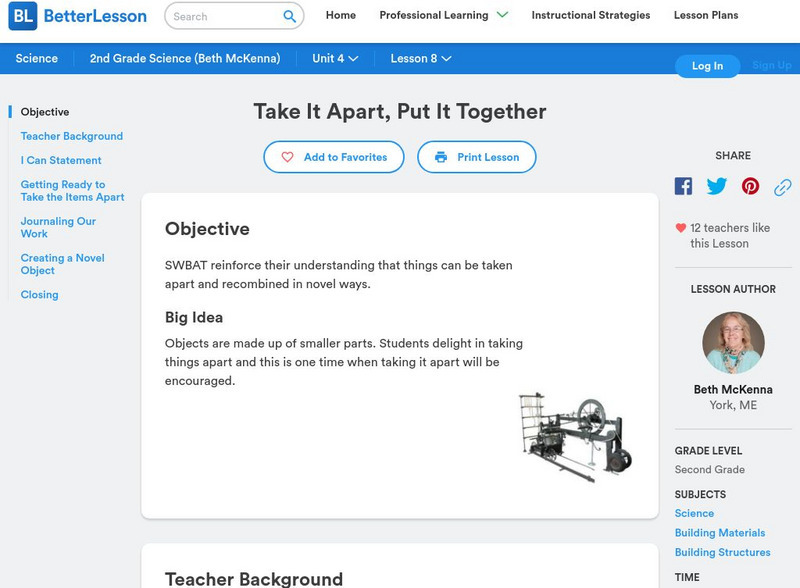The Wonder of Science
The Wonder of Science: 2 Ps1 3: Objects and Pieces
This NSTA vetted source includes resources to show that an object made up of a small set of pieces can be disassembled and made into a new object. Included are assessment ideas, videos, examples, lesson plans, and photos of student work.
The Wonder of Science
The Wonder of Science: Ms Ps3 3: Thermal Energy Transfer Solution
Lessons to show thermal energy transfer. Middle schoolers will "apply scientific principles to design, construct, and test a device that either minimizes or maximizes thermal energy transfer".
CBS
Tech Republic: Project Manager: Graphics 101
Detailed beginner's tutorial in creating online graphics. Requires access to a bitmap editor. Choose among topics, or work the entire 15 page tutorial in order.
PBS
Pbs: Nova: Destroy the Castle
Design your own trebuchet catapult, launch the sandstone balls, and destroy the castle. Decide on the size of your projectiles, where to place your trebuchet, and other factors critical to success.
Better Lesson
Better Lesson: Building Things in Different Ways
This lesson poses the question "can you always take something apart and put it together in different ways?". Students will take part in designing an investigation using snap cubes to help figure out an answer. Videos of the lesson in...
Better Lesson
Better Lesson: Take It Apart, Put It Together
The purpose of this lesson is to reinforce the idea that things are made up of small parts that can be recombined in novel ways. It also shows that the shape of certain parts dictates their function. Students delight in taking things...
Other
Pankpages
Site contains free downloadable graphics such as buttons and backgrounds, as well as tutorials which focus on Photoshop.
Other
Web Reference: Rough It Up: Production Graphics
An article about using abstract shapes and positions of images to create interesting effects. Includes a tutorial.
Other
Beanz: How We Designed a School Robot
Learn how an all girls high school robotics team designed then built a robot to compete in competitions.
Pew Research Center
Pew Research Center: Concerns About the Future of People's Well Being
As in all great technological revolutions, digital life has and will continue to have a dark side. A discussion that explores this issue.
Thinkport Education
Thinkport: Designing a Healthier, Happier Meal: Make a Prototype/test the Design
Mke and test a prototype of your healthy fast food meal.
PBS
Pbs Kids: Dinosaur Train: Buddy's Big Campout Adventure
In Buddy's Big Campout Adventure, practice being good friends by gathering items to get the campsite ready.
ABCya
Ab Cya: Make a Treehouse
Design the treehouse of your dreams with ABCya's Make a Treehouse! Choose from tree types, wood varieties and more. Would you like to build a house in a rainbow eucalyptus tree? No problem! How about a roller coaster entrance, and a...
ABCya
Ab Cya: Make a Skateboard
Make a Skateboard is a radical activity for gnarly skaters of all ages! Go through a step-by-step process selecting different board shapes, grip tape, trucks, wheels, paint, stickers, and awesome extras! No two boards are the same. What...
ABCya
Ab Cya: Make a Cupcake
Make a Cupcake is fun activity for preschool and kindergarten students. Kids go through a step-by-step process selecting different cupcake colors, frostings, sprinkles and toppings! No two cupcakes are alike! Remember to press "Finished"...
ABCya
Ab Cya: Make a Cookie
Make a Cookie is yummy activity for preschool and kindergarten students. Kids go through a step-by-step process selecting different cookie shapes, colors, frostings, sprinkles and toppings! No two cookies are alike! Celebrate the...
ABCya
Ab Cya: Make a Cake
Make a Cake is a fun computer activity for kids to learn mouse manipulation skills, letters and numbers one to ten! First, children select a cake to decorate. Next, they add different color frosting, designs, letters and numbers!...
ABCya
Ab Cya: Make a Backpack
Make a Backpack is a fun activity for students of all ages. Kids go through a step-by-step process of selecting different styles, colors, patterns, and keychains!
ABCya
Ab Cya: Make an Easter Egg
Easter Egg Fun is a holiday activity for kids to decorate and hide an Easter Egg! Kids can choose an egg, paint it, put stickers on it, put a toy inside it, hide it and then find it!
ABCya
Ab Cya: Magic Mirror Paint
Magic Mirror Paint is an online art activity that allows users to create their own magic mirror masterpiece! With a huge pallet of colors and lots of fun tools, the only limit is your own imagination!
National Council of Teachers of Mathematics
Nctm: Figure This: Statue of Liberty
Is the Statue of Liberty's nose too long? Challenge is to figure out the length of the Statue of Liberty's nose by knowing the length of her arm.
CK-12 Foundation
Ck 12: Algebra Ii: 5.6 Observational Studies, Experiments, and Surveys
This section explores how to design and conduct surveys that accurately reflect the perspectives of a larger group of people by identifying unbiased sample groups and by writing unbiased questions.










